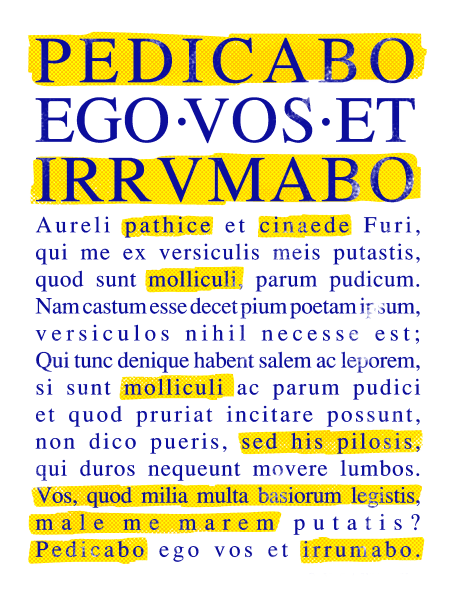LGBT History
Bible and homosexuality: the word of god.

I love Sodom. Drawing for the Protest Collection by Moscas de Colores, against homophobic bible.
The creation of a homophobic Bible.
In 382 of our era, one of the most influential books in the history of humanity was released. A compendium of Jewish and Christian sacred texts, duly reviewed and approved by the Roman Curia. The bible, the biblical canon or the vulgate. From this moment on, the word of the Christian god was one and as we have always been told, it clearly said that this god did not love homosexuals. Or this is what we have been led to believe.
If we want to find any moral judgement of a “homosexual” person in the holy scriptures, the first thing we should do is to get a bible edited from 1946 on, and particularly, some protestant bibles that came out after the publication of the Revised Standard Version. Otherwise, no matter how deep you search, you can will not be able to find any mention of homosexuals in either the Old or New Testament. This is because the term homosexual and its associated concept, were born in the late nineteenth century.
What you will surely find in other versions of the bible, is the word sodomite, a term that usually refers to those who practice sodomy. This change from sodomite to homosexual meant a switch of perspective, from condemning the particular act of a particular person, to condemning an individual, or millions of them, for the simple fact of being or feeling homosexual. God, according to some, not only hates the sin but also the sinner. As the saying goes, the devil is in the details.
At this point, ignoring the small translation “mistake” and based on what the bible says, many will still think that god does not like sodomites. But , is that true?
I Survived Sodom (The meanings of sodomite).
To find the answer we must go back a few centuries. And I mean centuries, and not millenniums, because, same as we have to read a post-50s bible to find a moral judgement of a “homosexual” person, we also have to use a text translated from the Middle Ages on, and more specifically after the eleventh century, to find a biblical censorship to sodomites. Up to this date, a sodomite was just an inhabitant of Sodom, and God, or Physics, had already dealt with them couple of millennium before, leaving none alive.

The relationship between The Bible and Homosexuality reached one of its peaks with the story of Sodom. I Survived Sodom is the Drawing & Story we have created about it, done with humor and against the homophobic bible.
Non reproductive sex
It is however curious that, even when the meaning is reversed, the word sodomite does not come to be referred only to men who have sex with other men, but to anyone who has any type of sexual activity that is not specifically aimed at procreation, either masturbation, heterosexual coitus interruptus, oral sex, intercrural sex (between the thighs) or any position other than the man on top and woman below, because at that time it was believed that another position reduced the chances of procreation. And of course, the reviled and feared anal intercourse. Only several centuries later would Sodomite be used to exclusively designate acts of sex between men.
Abusing instead of knowing
But, how do you go from being an inhabitant of Sodom to being a homosexual pervert? Well, then again, with a linguistic interpretation. In this case of the Hebrew verb ידע (yada), which literally means to know. Even though it sometimes has a sexual connotation (a virgin who knew no man), in this case it was translated as abuse or rape.
Let us take two different translations of Genesis 19.5
Homophobic version
“They called out to Lot and asked, “Where are the men who came to visit you tonight? Bring them out to us so we can have sex [ ידע (yada)] with them!” (International Standard Version)
Not homophobic version
“And they called unto Lot, and said unto him, Whereare the men which came in to thee this night? bring them out unto us, that we know [ידע (yada)] them..” (King James Bible)
Without going into linguistic or historical disquisitions about the customs of the Semitic peoples, what is clear is that the devil remains in the details again, and that the role of the translator in the scriptures is essential.
Consecrated faggots.
After turning the inhabitants of Sodom into faggots, the word sodomite replaced several Hebrew and Greek terms used so far in translations, in particular, in the Old Testament. It took the place of the Hebrew word קָדֵשׁ (qadesh) resulting texts like …
D 23,17:“There shall be no prostitute of the daughters of Israel, neither shall there be a sodomite [קָדֵשׁ (qadésh)] of the sons of Israel.” (American Standard Version)
1R 14, 24:“and there were also sodomites [קָדֵשׁ (qadésh)] in the land: they did according to all the abominations of the nations which Jehovah drove out before the children of Israel.” (American Standard Version)
1R 15, 12: “And he put away the sodomites [קָדֵשׁ (qadésh)] out of the land, and removed all the idols that his fathers had made”. (World English Bible)
1R 22, 47:“And the remnant of the sodomites [קָדֵשׁ (qadésh)], which remained in the days of his father Asa, he put away out of the land.”. (English Revised Version)
2Re 23, 7:“And he brake down the houses of the sodomites [קָדֵשׁ (qadésh)] that were in the house of the LORD, where the women wove hangings for the Asherah.” (English Revised Version)
Job 36, 14:“Their soul shall die in a storm, and their life among the effeminate [קָדֵשׁ (qadésh)]“. (Douay-Rheims Bible)
But what is the real meaning קָדֵשׁ (qadesh)?
Hierodule
Literally, and although it may seem surprising and even ironic, קָדֵשׁ (qadésh) means “the sacred”, although the most correct interpretation of the term, used in translations of the Torah is the word of Greek origin, hierodule. That is, slaves dedicated to the cult of pagan gods and sometimes offered as ritual prostitutes. Note that the feminine version of this word (qedeshá) became translated simply as female prostitute.
So in reality, the קָדֵשׁ (Kadesh) were not homosexual, neither gay, nor people of Sodom, but simply sacred prostitutes. Another small translation mistake which, in this case, is repeated over and over again in the Old Testament, and which served to point out and condemn gays for over a millennium.
From the sacred to the profane.
There is more yet, the word sodomite not only came to replace the Hebrew term קָדֵשׁ (qadesh) but was also used to translate the Greek word ἀρσενοκοῖται (arsenokoitai) in the New Testament. This term appears only twice, both by the hand of the apostle St. Paul in his epistles to the Corinthians and Timothy.
These epistles are the strongest evidence of the unequivocal rejection of gays for intolerant christians. It is not only the vengeful, and to some extent cruel God of the jewish Old Testamen that rejects gay peoplet, but also the kind and merciful god of the christian New Testament. A rejection which carries the maximum sentence, to be set apart from the kingdom of god.
Corinthians 6.9-10: “Or do you not know that the unrighteous will not inherit the kingdom of God? Do not be deceived; neither fornicators, nor idolaters, nor adulterers, nor effeminate [μαλακοῖς (malakois)], nor homosexuals [ἀρσενοκοῖται (arsenokoitai)]” (New American Standard Bible)
St. Paul, Malakois and Arsenokoitai
After reading this there should be no doubt about God´s point of view, but to give greater emphasis to this condemnation, in most modern translations the word sodomite appears next to the term effeminate. This is a somewhat free interpretation of the Greek word μαλακοῖς (malakois), which literally means deadbeat, lazy or weak, but within a moral context it means licentious or dissolute. Even St. Augustine saw a reference to masturbation in this word.
Going back to the translation of ἀρσενοκοῖται (arsenokoitai) as sodomite, Can it be considered a correct translation? What is its original meaning? No one really knows exactly, because this Greek term appears for the first time in the New Testament. As we have said, it comes from the hand of Paul. It literally means “male bed” or “male to take you to bed”, and it is thought that Paul (or whoever) created this neologism to avoid the use of the Greek term hierodule (ἱερόδουλος), stripping thus these pagan practices of temple prostitution of any sacred function ἱερό (the sacred).
This would also explain why the author does not use common expressions in Greece to point to “homosexuals”. This is, terms like palakós, kinaidos, paiderastes, arrenomanes or paidophthoros. Having so many words to choose from, why invent a new word? We may never know the answer for sure, or know who he was referring to specifically, but if we are to freely translate words why not converting the word ἀρσενοκοῖται (arsenokoitai) to sodomite and later to homosexual? Who can bothered or disturbed?
4 Words.
With this last reference, more or less, direct references to homosexuals in the Bible are finished. There are no more. Although it may seem surprising, all or most modern biblical homophobic construction is based on the translation of four very concrete terms. 4 simple words.
ἀρσενοκοῖται (arsenokoitai)
μαλακοῖς (malakois)
קָדֵשׁ (qadésh)
ידע (yada)
Homosexuality does not exist then
I do not want to mean with this that the bible or the christian god looks favorably to homosexuals or homosexual behavior (allah save me), but simply that there is not any type of defined statement about a reality that was non-existent or irrelevant throughout the thousand years that the various books of the bible were written in. The Homosexual being as we understand it today did not exist and therefore god could not condemn him or her.
Pagan rituals and sexual customs
As a general rule interpretations made about homosexuality in the Old and New Testament are not such, but they usually refer to the pre-christian pagan rites and Greco-Roman sexual mores, which included the sexual abuse of underaged slaves and ritual prostitution. The rest are interpretations that can only be understood in their context, being this not only that of those who wrote the original texts in Aramaic, Greek or Hebrew, but also the one from those who, over the last nearly 2,000 years translated and interpreted “the word of god”.
So if someone, at some point, lifts his finger pointing at you and states that you shall burn in hell or that God hates you and will punish you, ask him what version of the Bible says that.
For me, and I guess for many like me, considering my own life based on the thoughts and beliefs of some goat herders from 2500 years ago, makes very little sense. However, it is always interesting to understand how we got where we are, and without knowing and understanding the bible and its context, it would be quite complicated.
There is hope, though. Recently the new Queen James version of the bible was launched in the U.S. It seeks to avoid all these little “flaws”.
“Praise be to Google, through its searches thou shall find the truth. Amen.”
Final translation by Ruth Carballo Gallego.
Recommended links: - I love Sodom - I Survived SodomTag :Dictionary, Homophobia, Religions And leave us a comment







Something to say?
Tell us what you think of this article. If it’s good or bad, if you think we are idiots, or if you see us in hell. Even if you are a few words person, you can do something to improve people’s lives, helping us to spread it.
Share it in your networks!